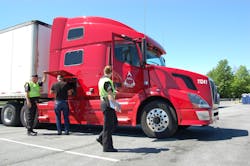A plan by the Federal Motor Carrier Safety Administration (FMCSA) to allow additional and changing options for meeting the records of duty status (RODS) for the first four years “would become problematic for roadside enforcement,” according to comments filed by an advocacy group representing state law enforcement officials.
In comments filed June 19 on FMCSA’s supplemental notice of proposed rulemaking (SNPRM) regarding electronic logging devices (ELDs) and supporting documents, the Commercial Vehicle Safety Alliance (CVSA) recommended instead that current methods – paper RODs and automatic onboard recording devices (AOBRDs) – be allowed to be used for three years following implementation of the rule and that FMCSA require all drivers who required to maintain RODS to use ELDs meeting the new standards after three years.
CVSA noted that under FMCSA’s proposal, there would be three acceptable compliance methods during the first two years of a final rule’s implementation: paper RODS, AOBRDs and ELDs. Then in years three and four, there would be two compliance methods: AOBRDs and ELDs. Instead, CVSA recommends a clean break between the current compliance methods and the new one. Carriers using paper logs would be allowed to use them for another year.
In its SNPRM, FMCSA had proposed to ease the burden on carriers now using AOBRDs by giving them an extra two years to use existing devices before converting to ELDs meeting the new standards.
“A three year compliance date ensures that there is enough time for suppliers to meet the demand, motor carriers to budget for changes, and roadside enforcement and drivers to receive adequate training and implement any technology changes that may be necessary to meet the communications requirements,” CVSA said.
In another stance likely to draw some opposition, CVSA recommended that FMCSA require that drivers maintain in the vehicle the required hour-of-service supporting documents for the current day and the past seven days. “In order to accurately evaluate compliance, it is essential for the roadside inspector to have access to these documents to verify location, time, and date of all driver duty status entries,” the group added.
CVSA asked FMCSA to conduct before issuing a final rule a comprehensive study of current state technology/communication capabilities for CVSA-certified inspectors and identify what steps would be necessary to ensure that all certified inspectors will be able to access data roadside in an effective, efficient, and secure manner.
“Before decisions are made on data transfer options, the Agency needs to ensure that whichever method (or methods) is selected serves one of the primary end users – the inspector,” CVSA said. “If a device cannot be accessed roadside by all inspectors, the device will not serve its intended purpose – to electronically collect and transmit a driver’s hours of service data for compliance and enforcement purposes.”
